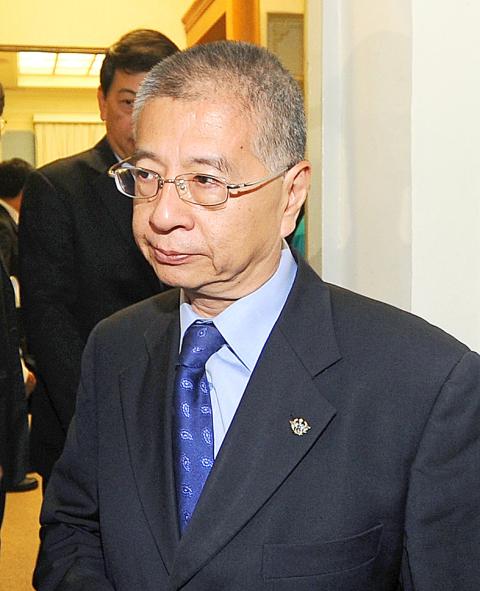Provocations and tension from China are on the rise, but Taiwan is always prepared to defend itself — with or without US help — former minister of national defense Andrew Yang (楊念祖) told a Washington conference on Thursday.
“We always assume that defending ourselves is our own responsibility,” Yang said.
Now an assistant professor at National Sun Yat-sen University, Yang was answering a question as to whether Taiwan had an “unrealistic expectation” about when US help would arrive — or even if it would arrive at all — in the case of a Chinese invasion.

Photo: Taipei Times
“I get asked this question all the time,” he said.
Yang said that as a “responsible, accountable government,” Taipei had to assume it might have to stand alone.
He repeated that in terms of national defense policy, the nation had to take responsibility for itself.
“It is a commitment we have made to our own survival and to our people, and that is very important,” Yang said.
He also told the Jamestown Foundation’s fifth annual China Defense and Security Conference held at the Carnegie Endowment that cybersecurity was “high on the agenda” in terms of defense.
Yang said that Taiwan faced millions of cyberattacks from China and that they came on a daily basis.
He said that Chinese expansion of air and naval activities in the East and South China seas added tension and the threat of escalation to the region.
“Taiwan inevitably is facing challenges and threats in the course of military and security game changes,” he said.
In addition, Taiwan’s challenges and threats were “more imminent” than those faced by other US allies in the region, Yang said.
The military threat from China has remained a daily reality, he said.
“Beijing still holds the option to employ the use of force to achieve political unification,” Yang said.
In a paper prepared for the conference, Yang said that Taiwan and the US shared common concerns regarding the strategic and security situation, particularly China’s increasing naval and air power projection into the East China Sea.

NATIONAL SECURITY THREAT: An official said that Guan Guan’s comments had gone beyond the threshold of free speech, as she advocated for the destruction of the ROC China-born media influencer Guan Guan’s (關關) residency permit has been revoked for repeatedly posting pro-China content that threatens national security, the National Immigration Agency said yesterday. Guan Guan has said many controversial things in her videos posted to Douyin (抖音), including “the red flag will soon be painted all over Taiwan” and “Taiwan is an inseparable part of China,” while expressing hope for expedited “reunification.” The agency received multiple reports alleging that Guan Guan had advocated for armed reunification last year. After investigating, the agency last month issued a notice requiring her to appear and account for her actions. Guan Guan appeared as required,

A strong cold air mass is expected to arrive tonight, bringing a change in weather and a drop in temperature, the Central Weather Administration (CWA) said. The coldest time would be early on Thursday morning, with temperatures in some areas dipping as low as 8°C, it said. Daytime highs yesterday were 22°C to 24°C in northern and eastern Taiwan, and about 25°C to 28°C in the central and southern regions, it said. However, nighttime lows would dip to about 15°C to 16°C in central and northern Taiwan as well as the northeast, and 17°C to 19°C elsewhere, it said. Tropical Storm Nokaen, currently

‘NATO-PLUS’: ‘Our strategic partners in the Indo-Pacific are facing increasing aggression by the Chinese Communist Party,’ US Representative Rob Wittman said The US House of Representatives on Monday released its version of the Consolidated Appropriations Act, which includes US$1.15 billion to support security cooperation with Taiwan. The omnibus act, covering US$1.2 trillion of spending, allocates US$1 billion for the Taiwan Security Cooperation Initiative, as well as US$150 million for the replacement of defense articles and reimbursement of defense services provided to Taiwan. The fund allocations were based on the US National Defense Authorization Act for fiscal 2026 that was passed by the US Congress last month and authorized up to US$1 billion to the US Defense Security Cooperation Agency in support of the

PAPERS, PLEASE: The gang exploited the high value of the passports, selling them at inflated prices to Chinese buyers, who would treat them as ‘invisibility cloaks’ The Yilan District Court has handed four members of a syndicate prison terms ranging from one year and two months to two years and two months for their involvement in a scheme to purchase Taiwanese passports and resell them abroad at a massive markup. A Chinese human smuggling syndicate purchased Taiwanese passports through local criminal networks, exploiting the passports’ visa-free travel privileges to turn a profit of more than 20 times the original price, the court said. Such criminal organizations enable people to impersonate Taiwanese when entering and exiting Taiwan and other countries, undermining social order and the credibility of the nation’s